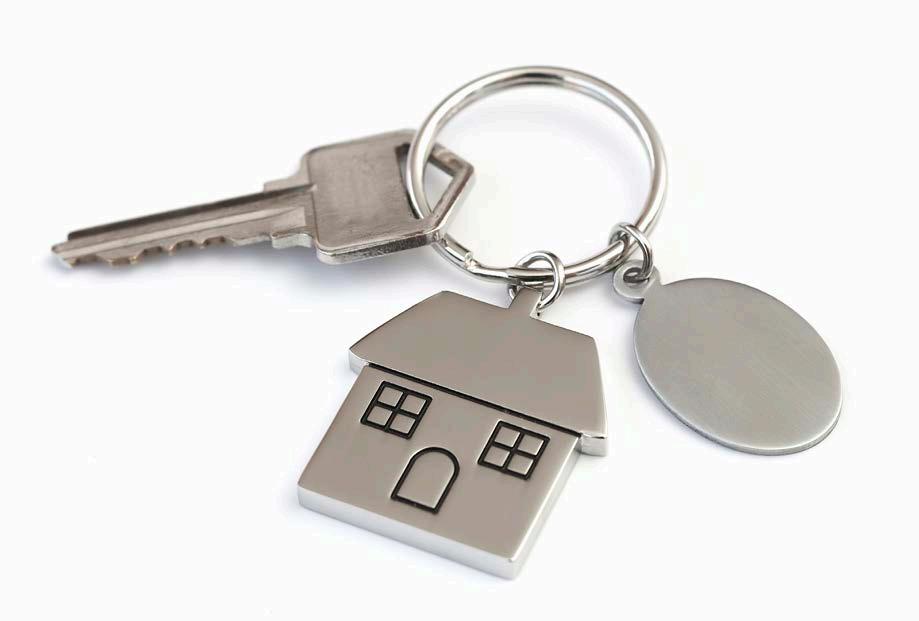HOME BUYING GUIDE
Everything you wanted to know about buying a home but didn’t want to ask.

A mortgage is the largest purchase you’ll probably ever make. You need a friend, someone who watches out for your best interest. Choosing TTCU for our mortgage was the best decision ever.” Matt N.

SO, YOU’RE THINKING ABOUT BUYING A HOME, AND YOU HAVE
SO MANY
QUESTIONS.
Don’t worry—questions are good! It means you’re putting thought into your decision and making sure you have the right information to take that next step.
That’s where we come in.
Buying a new home can be fun and exciting until you wade into the mortgage stuff. We know things can get scary and confusing—fast!

But read on!
These facts and tips from our TTCU Federal Credit Union mortgage experts will help you find your way, put you at ease and give you confidence—so you can get back to enjoying your home-buying experience.
TABLE OF CONTENTS LET’S TAKE THIS STEP BY STEP GET PRE-APPROVED GET A REALTOR OR GO IT ALONE THE MORTGAGE PROCESS CLOSING HOW LONG DOES THE WHOLE PROCESS TAKE?
LET’S TAKE THIS STEP BY STEP
What is a mortgage, anyway?
The mortgage is the agreement you sign when you borrow money. It says that your home will be used as collateral until your loan is paid off.
TTCU enabled me to live in my dream home with a mortgage loan that pays me back four times a year!
Heidi
(Ask about our member rewards!)
What is collateral?
Collateral is something of value owned by someone who wants to borrow money. When you borrow money and buy a house, your house becomes the collateral. The lender has the right to take your collateral your house if you don’t repay the loan.
How do I get started?
It sounds scary but it doesn’t have to be. Sure, buying a home is serious business. But if you borrow only what you can afford and make your payments on time, you’ll be fine. A good mortgage loan officer will encourage you not to bite off more than you can chew.

• Meet with a TTCU loan officer. A loan officer is a mortgage specialist. They’ll look at your employment, credit and financial information to see if you qualify for a home loan. The loan officer will help you decide which type of loan is best for your personal situation. And don’t worry, your TTCU loan officer and their team will be with you every step of the way from start to finish. You can see TTCU’s home loan options at ttcu.com.
• Gather your financial information to share with your loan officer.
• Fill out a loan application and be sure you have the paperwork to back-up everything you put in the application.
GET PRE-APPROVED
You’ll hear people talk about getting pre-qualified or pre-approved.
Here’s the difference:
Pre-qualification means a lender has given you an estimate of the loan amount you will likely qualify for.
Pre-approval means your credit, income and assets have been reviewed to support your requested loan amount.
How do I get pre-approved?
Your lender needs to verify your income, credit, funds and other financial information. They’ll do that with documents you provide, such as:
Pay
stubs
and W-2’s
Government-issued ID (driver’s license, passport, military ID, etc.)
Your loan officer will let you know if any additional paperwork is needed. Sometimes it depends on your loan type. Remember, your TTCU loan officer is working to put you in the very best loan for your situation based on your income, credit score and other financial information.
WHY SHOULD I BOTHER GETTING PRE-APPROVED?
Pre-approval could save you money and time. Pre-approval gives you power when you are negotiating with a seller. It lets the seller know your financing has been reviewed and often, the seller is willing to settle on a lower price because of it.

Now that you’re pre-approved and looking like a sure thing to all those sellers, let’s get on with the fun stuff shopping for the perfect home.
Mortgages are like everything else at TTCU. Comfortable.
Cheryl S.
The pre-approval status is only good for a limited time, so you should be ready to shop and purchase when you get pre-approved. Bank statements
OKOK asset statements Tax returns
or
GET A REALTOR OR GO IT ALONE?
A Realtor can be a big help, especially if you are new to the home-buying process.
A Realtor will help you find and look at available homes. More importantly, they’ll guide you through the contract negotiations and help you understand the inspection and title process.

Once you’ve found your house, settled on a price and signed a contract to purchase, it’s time for the mortgage.
A mortgage just feels more personable with TTCU.
THE MORTGAGE PROCESS
After you meet with your TTCU loan officer and submit your application, we:
• Verify your application is complete.
• Order your credit report.
• Verify your employment and other financial information.
• Order an appraisal of the property you want to purchase. This gives value to the home.
• Title company will verify that the property is free of judgments and liens and then handle the actual signing of the documents at the end of the transaction.
• Title company will also conduct a title search on the property. We’re just making sure you’ll legally own the property free and clear with no nasty surprises later.
• Have the property surveyed. That way you’ll know exactly where your property lines are.
• Prepare the loan for your signature and commitment.
• Receive final verification of employment prior to closing.
• Set a time for closing!
CLOSING
Your closing will usually be held at the office of the title company or lender. You’ll sign all the documents, make any required payments and receive the keys to your new home.
Your Realtor and loan officer can let you know ahead of time what to expect. During closing, check the documents for errors. Make sure your information is correct and the amounts are what you’ve agreed to before you sign.
THINGS TO AVOID DURING THE MORTGAGE PROCESS
Do not:
• Take on any new debt.
• Change your employment status (quit or change jobs).
These can cause delays in the mortgage process.
John & Mia
HOORAY
HOW LONG DOES THE WHOLE PROCESS TAKE?
Most mortgages close within four to six weeks after you sign the purchase contract. Some take longer, some close more quickly. You can help things along by making sure your paperwork is in order and by getting requested documents to your loan officer quickly.
At TTCU, we welcome your questions. Our only goal is to get you in the right home loan for you. And remember, we’ll be with you from that first meeting to your final payment.
When you’re ready to purchase a home, give us a call! Or visit ttcu.com and start your application process online. We’ll be glad to help!

KNOW YOUR MORTGAGE LINGO
Adjustable-rate mortgage (ARM): Type of mortgage in which the interest rate can change throughout the life of the loan.
Cap: Limits how much the interest rate or mortgage payments may increase or decrease in an adjustable-rate mortgage.
Closing disclosure: A document that shows the final costs associated with your mortgage loan. You must receive and acknowledge the disclosure three days before closing.
Contingency: A condition that must be met before a contract is legally binding. For example, home purchasers often include a contingency that says the contract is not binding until they receive a satisfactory home inspection report.
Debt-to-income ratio: A borrower’s monthly payment on long-term debts divided by their gross monthly income.
Escrow: Money, documents or other items of value held by a third party. The third party releases the items once a condition is met. For example, a deposit the borrower makes to the lender would be kept in escrow, to pay real estate taxes and insurance premiums when due.
Fixed-rate mortgage: Type of mortgage with an interest rate that does not change the entire life of the loan.
HELOC: Home Equity Line of Credit loans give you access to cash based on what your home is worth. Many people use these for home improvement, but they can also be for other purposes such as life’s unexpected emergencies or consolidating debt.
Loan estimate: A document that gives you an estimate of the costs associated with your mortgage loan.
Private mortgage insurance (PMI): Protects the lender in case the borrower doesn’t repay the loan. PMI is often used when buyers make a down payment of less than 20% of the purchase price.
Points (loan discount points): Borrowers often pre-pay some of the interest at closing. Each point equals 1% of the loan amount.
Principal, interest, taxes and insurance (PITI): The four components of a monthly mortgage payment. Also called the loan payment.
Title insurance: A separate insurance policy purchased for the benefit of the lender and buyer. The policy protects against error, omissions or defects in the title of a property.
Some restrictions apply. With approved credit. Flood and/or property insurance may be required.







